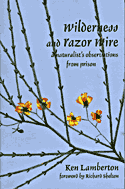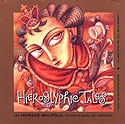 |
|||
Fiction  |
& | Translation | |
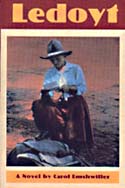  |
Ledoyt | Carol Emshwiller “Ms. Emshwiller is so gifted.... She describes the ragged, sunswept Western countryside with a vividness and clarity that let us see it as her characters do—and understand why they love it as they do. There are moments of this book that are remarkably moving; there are scenes of great power.” (New York Times Book Review) “A fierce and tender portrait of a girl growing up fierce and tender; a sorrowful, loving portrait of a man whose talent is for love and sorrow; a Western, an unsentimental love story, an unidealized picture of the American past, a tough, sweet, painful, truthful novel.” (Ursula K. Le Guin) “As haunting as the song of a canyon wren at twilight.” (Atlanta Journal) and its sequel |
||
 |
|||
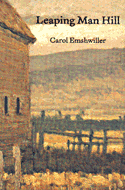  |
Leaping
Man Hill | Carol
Emshwiller With Leaping Man Hill Carol Emshwiller continues to breathe life into the American Western, turning the genre on its head, filling it with surprises, and giving it unparalled authenticity, power, and poignancy. “Both a heartfelt family drama and a tender love story that marks Emshwiller as a writer of distinctive talent.” (Publishers Weekly) “I was going to read Leaping Man Hill very very slowly to enjoy it and the first day I did, but the second day to hell with it, I read the whole thing SNAP GULP nothing could stop me. I mean I HAD to find out, didden I?” (Ursula K. Le Guin) |
||
 |
|||
  |
The Diary of Emily Dickinson | Jamie Fuller In her fictional diary of one year in the poet's life, Jamie Fuller has brought Emily Dickinson’s poetry, letters, and the biographical information we have about her, together with factual history of Amherst in 1867, in a work so delicately and smoothly written, in a style so closely resembling Emily’s own, that it becomes difficult to separate fact from fiction. “An
inspired creation. Fuller, a poet, translator, and editor, has absorbed
Dickinson’s poetry like a plant soaks up sunlight, and her literary
photosynthesis revitalizes our appreciation for Dickinson’s art and
wisdom.” (Booklist) |
||
 |
|||
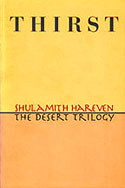  |
Thirst: The Desert Trilogy | Shulamith Hareven | tr. Hillel Halkin Here Israeli writer Shulamith Hareven achieves her greatest work, bringing the biblical past to life with her sure and powerful voice. The trilogy brings vivid drama, characterization, and emotion into high relief against its desert backdrop, as Hareven creates a palpable reality that rings true to its biblical and historical antecedents. “Evocative and lush prose.” (New
York Times Book Review) “First-rate fiction, beautifully translated, by one of the world’s great contemporary women writers.” (Publishers Weekly)
|
||
 |
|||
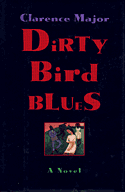  |
Dirty Bird Blues | Clarence Major “With this gorgeously bluesy tale of love, hate, and doing right, Major will take center stage.... He thrills us with some of the wittiest, most melodious inner dialogue ever written and moves us with dramatic confrontations between loved ones that are remarkable for their sensitivity, authenticity, and significance.” (Booklist) “Like the blues, the novel and its central character keep edging back into the reader’s consciousness after the book itself is read and put away.” (Washington Post) |
||
 |
|||
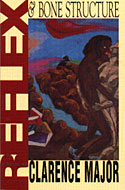  |
Reflex & Bone Structure | Clarence Major Reflex and Bone Structure, nominated in France for the Prix Maurice Edgar Coindreau Award for literary crime fiction, is a mystery story in which words both cloak and reveal, and in which what is real becomes confounded with what is imagined. It has established itself as a classic of modern African-American literature. “Clarence Major has a remarkable mind and the talent to match.” (Toni Morrison) “Breaking with the linear tradition in black literature, moving us from narrative to the crux of the moment.” (Ntozake Shange) |
||
 |
|||
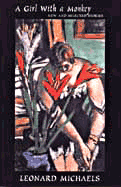  |
A Girl With a Monkey: New and Selected Stories | Leonard Michaels A LOS ANGELES TIMES BEST FICTION TITLE OF 2000,FINALIST, 2000 BAY AREA BOOK REVIEWERS FICTION AWARD “Brilliant ...
Anyone
concerned with the American short story should read and know these
stories....
Other American writers have tried to write stories like these, but
Leonard
Michaels got there and has done it better than almost anyone
else.”
(San Francisco Chronicle) “Love and sexuality are the twin themes he continues to mine, and the specific situations he creates to explore these themes pinpoint in the sheerest of prose the absolute truth about relationships. Michaels’s trenchant, direct, and lyrical style, with not one word wasted, works as a tight springboard for conveying his vast knowledge about why we love who we love.” (Booklist) |
||
  |
|||
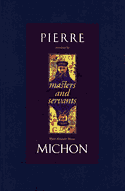  |
Masters
and Servants |
Pierre Michon | tr. W.A. Mason Masters and Servants captures the intimate and intricate detailwork of five artists’ lives through exquisitely crafted fiction. The Arles postmaster Roulin reveals Van Gogh’s yellow countryside. Spanish women haunt the corners of Goya’s Madrid, singsonging his eccentricities. Watteau’s secret erotic portraiture captivates a parish priest. Lorentino, an obsure disciple of Piero della Francesca, daydreams of his master while bartering one of his finest paintings for a pig. A stranger spies on Claude Lorrain, becoming mesmerized by the painter’s relationship to his landscape, slowly hypnotized by the beauty of the woodlands, as is Lorrain’s brush. “Michon offers a brilliant tour de force of five pieces about art and artists: an often indescribably eloquent modern taking up where Vasari, say, might have left off.... Stylistically demanding, but a book often as passionate, beautiful, and skilled as the paintings it springs from.” (Kirkus Reviews) “Do not miss this little masterpiece.” (Le Monde) |
||
 |
|||
  |
The Origin of the World | Pierre Michon | tr. W.A. Mason WINNER, 2002 HEMINGWAY TRANSLATION GRANT A twenty-year-old takes his first teaching job in a sleepy French town. There, he falls under the spell of one of the town’s residents, an older woman of transcendant beauty. During a season of rainy days and sleepless nights, the young teacher learns firsthand about the most ancient of urges and the most brutal of realities. The Origin of the World is a devastating exploration of the destructive powers of passion, and the consuming need for love. “An astonishingly rich, mythic new direction in modern French narrative.” (Guy Davenport) “A slender book in length, but not in style and language.... Michon’s short fable obliges us to recognize, within and beyond sexual fantasy, strains of cruelty directed toward beauty.” (Harper’s) |
||
  |
|||
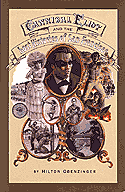 |
Cannibal
Eliot and the Lost Histories of San Francisco | Hilton Obenzinger |
||
  |
|||
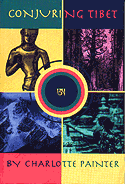 |
Conjuring Tibet | Charlotte
Painter “Conjuring Tibet—a wonderful book that tells mythically and realistically a story about Tibet in the nuclear age. Charlotte Painter evokes the old gods that they might free us from the inhuman world we have made. She makes sense in modern Western terms of the very difficult subtle ideas of peoples—mystics and dialectic materialists—on the opposite side of the planet. This book contains the valuable knowledge that she has brought back from her explorations.” (Maxine Hong Kingston) “Charlotte Painter is that perfect traveler—accepting, observant, and a little mad to go to the places she does. Her Tibet is as varied, funny, and gripping as a novel, as this is called, but her grace and learning make this a wonderfully true book, and great reading.” (Diane Johnson) |
||
  |
|||
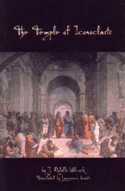  |
The Temple
of Iconoclasts
| J. Rodolfo Wilcock | tr. Lawrence Venuti |
||
 |
|||
Non-Fiction |
/ | Cultural Studies | |
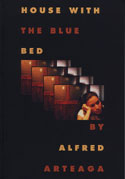
|
House with
the Blue Bed | Alfred Arteaga WINNER, 1998 PEN OAKLAND JOSEPHINE MILES AWARD FOR EXCELLENCE IN LITERATURE In House with the Blue Bed, Alfred Arteaga reflects on being Chicano, poet, father, race car driver, musician, world traveler, professor. In a series of compact chapters—by turns personal, anecdotal, poetic, and political—Arteaga addresses an array of themes extracted from the prism of his personal experience. “A fizzy Sarduyian brew, Arteaga’s House with the Blue Bed traces Chicano dislocasia where dream and reality, West Coast and Western world float on a churning surface of prose, both spare and lush.” (Suzanne Jill Levine) |
||
 |
|||
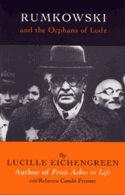  |
Rumkowski & the Orphans of Lodz | Lucille Eichengreen “Lucille Eichengreen tells the true story of Chaim Rumkowski, the principal person in charge of the Lodz Ghetto, where the author was sent with her mother and sister. Her mother died in the ghetto, and her sister was sent to a concentration camp. She thus remained alone, orphaned, under the command of Rumkowski, who, taking advantage of his power, abused the orphans of Lodz, including Lucille. A beautiful testimony, simply written.” (Bulletin Trimestriel da la Fondation Auschwitz) |
||
 |
|||
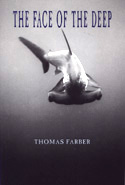 |
The Face
of the Deep | Thomas Farber In The Face of the Deep we float on and submerge below the ocean’s liquid mirror, surfing and diving in “a continuum, concatenation, of sunrises, sunsets ...” From treasure hunters of Cocos Island to writers of the Literary Pacific, from Stevenson and Melville to the indigenous writings of Wendt and Hau‘ofa, Farber navigates the complexities of the Pacific and its peoples. With the play and music of his language, Farber’s shimmering reflections give us a fresh appreciation of the Pacific’s depths. “The Face of the Deep is a marvelous, poetic achievement ... a remarkable meditation on the polysemous richness of the sea, and a fascinating log of a risky voyage of self-discovery.” (Steven Greenblatt, Harvard University) |
||
  |
|||
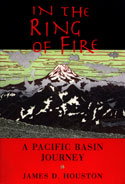 |
In
the Ring of Fire: A Pacific Basin Journey
| James D. Houston
“It is ... historical and cultural interactions that Houston illuminates beautifully with his descriptive skills and effortless prose. The book is a series of telling vignettes, each one building toward a sense of the new Pacific community that is emerging from decades of immigrant wanderings and imperialistic warfare.” (San Francisco Chronicle) “An elegant and thoughtful man in love with the many cultures that surround him, Jim Houston writes about his adventures in the Pacific Rim with sensitivity, courage, and a sense of wonder so contagious I’ve spent the last nights dreaming of lava flows, hot springs, and bowls of steaming noodles.” (Pam Houston [no relation]) |
||
  |
|||
|
Wilderness
and Razor Wire: A
Naturalist’s Observations from Prison |
Ken Lamberton “Wilderness and Razor Wire is
what nature writing can be, at its finest: a courageous and eloquent
exploration of what nature can teach us about how to be human.” (Susan
Tweit) “Nothing is more grand and resilient than the human spirit, and this astonishing testament to the coexistence of beauty and brutality illuminates the presence of grace in tragedy.” (Booklist) |
|||
  |
|||
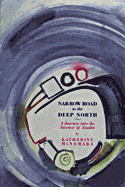  |
Narrow
Road to the Deep North: A Journey Into the Interior of Alaska
| Katherine McNamara “The author displays an impressive ability to blend the anthropological with the poetic, combining reportage with mystery, travel narrative with past, present, and forever.... The language used combines the heights of the heart with the facts of the matter, never blinking, as the author explores the relationships between Natives and whites, women and men, spirit and money, in a land that demands endurance from its residents.... The best introduction to Alaska a reader could want.” (Bloomsbury Review) |
||
  |
|||
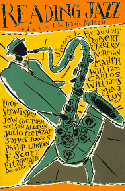  |
Reading
Jazz | ed. David
Meltzer |
||
 |
|||
  |
Writing
Jazz | ed.
David Meltzer |
||
 |
|||
 |
Green Essentials: What You Need to Know About the
Environment
| Geoffrey C. Saign “An easy-to-use ‘dictionary of environmental literacy,’ providing complete and up-to-date information on every major environmental topic.” (National Wildlife Federation) “Thoroughly researched, well written, and clearly presented. In this age of well-financed public relations efforts, sound-bites, and disinformation campaigns by those who would despoil the environment, Green Essentials provides a concise, informative voice of reason for the concerned layperson.” (Sierra Club Legal Defense Fund) |
||
  |
|||
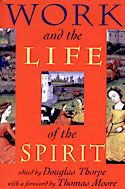  |
Work and
the Life of the Spirit | ed. Douglas
Thorpe |
||
 |
|||
NEA
Heritage 
|
& | Preservation
Series Celebrating the multicultural diversity of American letters with modern classics of cultural identity  |
|
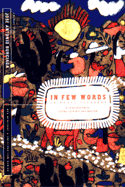  |
In Few
Words/En Pocas Palabras: A Compendium of
Latino Folk Wit and Wisdom
| José Antonio Burciaga A generous bilingual compilation of dichos—Latino folk sayings. Arranged by theme, these dichos express Latino wit and wisdom about subjects from Ability, Adversity, and Advice to Work, Writing, and Youth. “José Antonio Burciaga’s book of Latino folk sayings is a mesmerizing goldmine of the wisdom and wit of a people who can laugh off any hardship. As a true poet, Burciaga has come out with real jewels. Some can make us laugh; others can make us cry; all come from the deepest realm of our collective soul and heart.” (Francisco X. Alarcón) |
||
 |
|||
  |
Running
Through Fire: How I Survived the Holocaust |
Zosia
Goldberg | Introduction
by Paul Auster |
||
  |
|||
 |
The Wig
| Charles
Wright | Introduction
by Ishmael Reed “Charles
Wright’s Negro world explodes with the crazy laughter of a man past
caring.... His style, as mean and vicious a weapon as a rusty hacksaw,
is the perfect vehicle for his zany pessimism.... The Wig
is a brutal, exciting, and necessary book.” (Conrad
Knickerbocker, The
New York Times) |
||
  |
|||
 |
Film & Performing Arts | ||
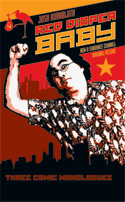 VISIT JOSH KORNBLUTH.COM |
Red Diaper
Baby: Three Comic Monologues
| Josh
Kornbluth FINALIST, 1997 JAMES THURBER HUMOR PRIZE Hilarious and
moving
autobiographical monologues from a rising star. Kornbluth
shows a deep affection for the wild, eccentric characters who people
his universe. With a few deft strokes he paints unforgettable
portraits, as true as they are funny. Together the monologues achieve
real literary form and depth, as we witness a young man coming of age
in a world that is anything but conventional. |
||
  |
|||
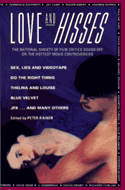
|
Love and
Hisses:
The National Society of Film Critics Sound Off on the Hottest Movie
Controversies
| ed.
Peter
Rainer
Love and Hisses pits the nation’s leading critics against each other as they take opposing sides on the most hotly debated movie controversies. “Love and Hisses will delight those who have found themselves in disagreement with a critic about a particular controversial film.” (Los Angeles Daily News) “Revealing and introspective insight on how film reviewers differ in their standards and analyses of movies they have come to praise or reproach.” (Entertainment Today) |
||
  |
|||
 |
Poetry | ||
  |
Dream of Order | Thomas Avena | Foreword by Adrienne Rich “Original, passionately wrought as to craft, sensual and delicate, un-selfish in a profound way.... Integrity saturates the texture of these poems.” (from the foreword by Adrienne Rich) “Like Camus in The Plague, Avena concludes that an instinct for survival prevails over ‘the body’s slow rupture.’ These poems—illuminated bodies—leave a vivid image on the retina.” (Library Journal) “Rendering memory and bearing witness through an often clinical eye, [Avena] investigates the intersections between death, art, and the emotional landscape of someone who has had more than his share of grief.... This is an ambitious book, with a compassionate intelligence.” (Voice Literary Supplement) |
||
  |
|||
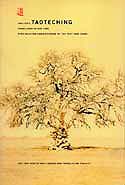 |
Taoteching | Lao-tzu | tr. Red Pine FINALIST, 1997 PEN CENTER WEST AWARD FOR TRANSLATION The Taoteching, written some 2,500 years ago by a man known only as Lao-tzu (“the Old Master”), encapsulates the wisdom of Taoism. Red Pine’s translation of this most revered of Chinese texts recreates the ancient poetry that has made the Taoteching the most quoted book in the Chinese language. “Here, one feels, are the bare bones, shining brightly.... Highly recommended.” (Library Journal) |
||
  |
|||
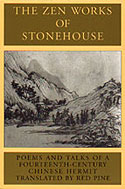  |
The Zen Works of Stonehouse: Poems and Talks of a Fourteenth-Century Chinese Hermit | tr. Red Pine Stonehouse has been called the greatest of all Zen monks who made poetry their medium of instruction. “Red Pine’s ... translation transports us to China in the fourteenth century, transfixes us in the beauty of the hermit poet’s work, and demonstrates the transformative power of a Zen adept’s talk.” (Dairyu Michael Wenger, San Francisco Zen Center) |
||
 |
|||
 |
Gothic Literature | ||
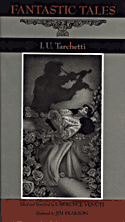  |
Fantastic
Tales | I.U.
Tarchetti | tr.
Lawrence
Venuti |
||
 |
|||
  |
Passion | I.U. Tarchetti | tr. Lawrence Venuti Set in mid-nineteenth-century Italy, Passion tells of a love triangle involving Giorgio, an officer in the Italian army; Clara, a robust young married woman with a child; and the groteque, vampire-like Fosca, who embodies the romantic macabre. Passion, in all its power and mystery, pulses through the novel. With morbid wit and a satiric edge, Tarchetti explores themes that will resonate with contemporary audiences—relating the erotic with disease, celebrating illicit love, and questioning the bourgeois ideal of feminine beauty. “Tarchetti’s striking novel ... has it all—obsession, deception, sex, death, and passion in many ineluctable forms ...” (Kirkus Reviews) |
||
|
|
 |
||
|
Hieroglyphic Tales | Horace Walpole The first trade edition of these wildly imaginative tales from the eighteenth-century originator of the Gothic genre. “The Hieroglyphic Tales were undoubtedly written a little before the creation of the world, and have ever since been preserved, by oral tradition, in the mountains of Crampcraggiri, an uninhabited island, not yet discovered.” “Bizarre, grotesque, and often baffling, both anticipating and outdoing modern experimental fiction.” (Los Angeles Times Book Review) “Nonsense in the best sense of the word.... Delightful.” (Library Journal)
Copyright
© 2000, 2006 Mercury House. All rights reserved.
|

